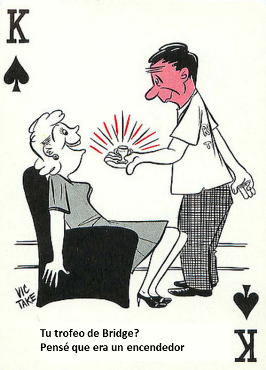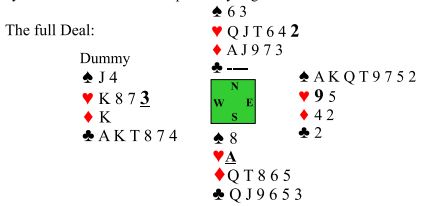Source: www.ababridge.org
E/W vulnerable, You are South.
The job of the defense is to use its relatively few assets (in comparison to the assets of the offense) to take as many tricks as possible. One major asset of the defense is the tempo associated with the opening lead. This tempo allows the defense to strike the first blow of the battle, and wise defenders don’t squander it. This is the key to the defenders’ successful defense.
Let’s examine what’s going on at trick 1, “Expert defenders” know that when the offense shows great strength, it is best to look for ways to manufacture defensive tricks with midrange cards. As a result, “expert defenders ” hoped that partner’s expected  A would provide the needed entry for the setting heart ruff to happen.
A would provide the needed entry for the setting heart ruff to happen.
But the first trick provided unexpected extra food for thought!
A 4 preempt bid is very often made on eight trumps and not much else because the preemptor fears 4
preempt bid is very often made on eight trumps and not much else because the preemptor fears 4 , or more, by the opponents. If all this is true, North can be expected to hold 2 Spades and at least 5 or 6 Hearts and have a host of options for how to follow suit to trick!.
, or more, by the opponents. If all this is true, North can be expected to hold 2 Spades and at least 5 or 6 Hearts and have a host of options for how to follow suit to trick!.
What does the  2 play mean?
2 play mean?
Partner knows as much as or more about hearts as you do. You both know that the  2, as attitude, makes no sense. Attitude is obviously negative and it is also most likely that you are leading a singleton and wouldn’t be able to return a heart if North wanted you to. So it’s partner’s responsibility to tell you how to reach her hand to get your ruff (
2, as attitude, makes no sense. Attitude is obviously negative and it is also most likely that you are leading a singleton and wouldn’t be able to return a heart if North wanted you to. So it’s partner’s responsibility to tell you how to reach her hand to get your ruff ( 2 for Clubs,
2 for Clubs,  Q for Diamonds and a middle, unreadable card for no preference).
Q for Diamonds and a middle, unreadable card for no preference).
 2 says partner has a Club void and that shouldn’t be hard for you to believe given all the Clubs you can see!
2 says partner has a Club void and that shouldn’t be hard for you to believe given all the Clubs you can see!
What followed was: T2:  Q,
Q,  K,
K,  3,
3,  2. T3:
2. T3:  2,
2,  5,
5,  8
8  7. T4:
7. T4:  Q,
Q,  K,
K,  A,
A,  2.
2.
The  Q confirmed South’s heart void.
Q confirmed South’s heart void.
North’s  4 requested another Club ruff, but South’s count of Clubs showed East would over-ruff another Club.
4 requested another Club ruff, but South’s count of Clubs showed East would over-ruff another Club.
So South opted to take the  A as the last (4th) trick for the defense to defeat this apparently impregnable sacrifice by two tricks for +500 and a top in a very large field. 5
A as the last (4th) trick for the defense to defeat this apparently impregnable sacrifice by two tricks for +500 and a top in a very large field. 5 makes for N-S.
makes for N-S.
Esta entrada también está disponible en: Spanish



